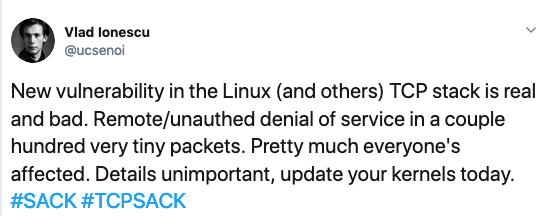A security researcher working for Netflix has discovered that the Linux kernel is affected by potentially serious vulnerabilities that can be exploited by a remote, unauthenticated attacker to launch denial-of-service (DoS) attacks.
The flaws, related to how the kernel handles TCP Selective Acknowledgement (SACK) packets with a low minimum segment size (MSS), could impact many devices, including servers, Android smartphones and embedded devices.
Exploitation involves sending specially crafted packets to the targeted device and some believe the flaws could have significant and widespread impact.

A total of three security holes have been identified. The most serious of them, dubbed SACK Panic and tracked as CVE-2019-11477, impacts Linux kernel versions starting with 2.6.29, which was released in 2009.
Another flaw, tracked as CVE-2019-11478 and dubbed SACK Slowness, impacts all versions of the Linux kernel prior to 4.15. This weakness also impacts the FreeBSD kernel if the RACK TCP Stack is used. The CVE identifier CVE-2019-5599 has been assigned to the FreeBSD version of this vulnerability.
The last flaw, tracked as CVE-2019-11479, is related only to MSS; the first two issues are related to both SACK and MSS.
Netflix has released an advisory describing the flaws and Red Hat has published a detailed description of the issues. Security advisories for the vulnerabilities have also been published by AWS, Canonical (for Ubuntu), Debian, SUSE, CoreOS, Oracle (for Oracle Linux), and Arch Linux.
Kernel updates that patch these vulnerabilities are available. Users who cannot install the patches can implement various mitigations, such as disabling SACK processing and blocking connections with a low MSS.
However, Red Hat warned that some mitigations “might affect traffic from legitimate sources that require the lower MSS values to transmit correctly and system performance.”
Cloudflare says it has rolled out patches to its infrastructure to protect customers against potential attacks. “If you’re behind Cloudflare you’re safe as long as you allow only connections from us,” explained Cloudflare CTO John Graham-Cumming.
Related: Linux Kernel Privilege Escalation Vulnerability Found in RDS Over TCP
Related: Linux Kernel Vulnerability Affects Red Hat, CentOS, Debian
Related: DoS Vulnerabilities Impact Linux Kernel
Related: ‘SegmentSmack’ Flaw in Linux Kernel Allows Remote DoS Attacks














